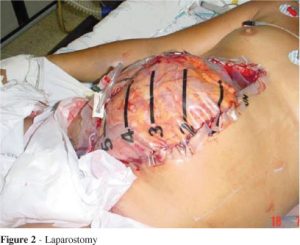Abdominal Compartment Syndrome – A Surgical Nightmare

Compartment syndrome is a well-recognized complication that occurs in the extremities. However, it can also occur in the abdomen and intracranial cavity. When it occurs in the abdomen, it refers to organ dysfunction caused by intra-abdominal hypertension and is called abdominal compartment syndrome or ACS.
Increased intra-abdominal pressure (IAP) may lead to intra-abdominal hypertension (IAH) and is caused by any number of clinical situations such as bowel distension, perforation or obstruction, a post-surgical abdomen, and ascites. Ascites is an abnormal accumulation of fluid in the peritoneal cavity. The most common cause is cirrhosis of the liver but is also found with cancer, chronic pancreatitis, heart and renal failure.
IAH is markedly increased IAP, and is common after extensive abdominal trauma due to an accumulation of blood and clot, bowel edema or congestion, and peri-hepatic or retroperitoneal packing after damage control laparotomy for diffuse nonsurgical bleeding. Closure of the swollen abdominal wall under tension may further aggravate the IAH.[i] IAH may result in organ dysfunction and failure and is therefore important to anticipate and attempt to prevent. If recognized it is imperative to establish immediate treatment as it can lead to ACS. It is important to note that IAH and ACS are two distinct and separate conditions, with untreated IAH leading to organ dysfunction and failure seen in ACS.
ACS is characterized by a “tensely distended abdomen, elevated intra-abdominal and peak airway pressures, inadequate ventilation with hypoxia and hypercarbia, disturbed renal function, and improvement after abdominal decompression.”[ii] It is observed to occur as a consequence of a variety of clinical events and can be divided into three categories:
Primary or acute abdominal compartment syndrome occurs when intra-abdominal pathology is directly and proximally responsible for the compartment syndrome.
Secondary abdominal compartment syndrome occurs when no visible intra-abdominal injury is present but injuries outside the abdomen cause fluid accumulation.
Chronic abdominal compartment syndrome occurs in the presence of cirrhosis and ascites or related disease states, often in the later stages of the disease.[iii]
In a recent case I was involved with, a patient went in for routine renal surgery and due to the failure of his surgeon to recognize post-operative bleeding despite continued bleeding and significant blood clots in the bladder. After days of an evolving ACS without treatment, evaluation by a second surgeon was emergently required and post-surgical iatrogenic ACS diagnosed along with a bowel perforation. The patient was required thereafter to have multiple surgeries to stop the bleeding. He lost part of his colon due to the perforation as a result of multiple surgeries, and his abdomen remained open with a would vac as it could not be closed safely. He was subject to a colostomy bag for a few months until reversal of the colostomy could be performed safely.
All of these medical problems lead to loss of his ability to work and provide for his family, financial ruin, depression, and loss of quality of life for his entire family, all of which could have been avoided if his original surgeon had simply recognized the postoperative bleeding and quickly evolving ACS.
This patient and his family deserve compensation for his physical pain and suffering as well as their emotional, and financial loss, and pain and suffering.
Make our team your team today…Do not risk missing an important issue in your malpractice case. Hire a professional with medical experience to make sure all relevant issues are addressed. This will provide you with more time to focus on the more important aspects of your case, and relieve anxiety that some important fact that could have helped settle your case in your favor was overlooked!
Med Legal Pro
Click here to Contact Us via email or Call 844-Med-Legl (633-5345)
Tracy Liberatore JD, PA
[i] Rao R. Ivatury, MD, Lawrence Diebel, MD, John M. Porter, MD, Ronald J. Simon, MD, Intra-Abdominal Hypertension and the Abdominal Compartment Syndrome, 77 Surgical Clinics of N. America 783, (1997)
[ii] Id.
[iii] Richard Paula, MD, Abdominal Compartment Syndrome, Medscape (Sep 15, 2015) http://emedicine.medscape.com/article/829008

